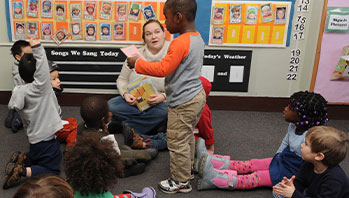- down
- up
- ramp
- zip
- zoom
MA Standards:
Foundational Skills/RF.PK.MA.2.a: With guidance and support, recognize and produce rhyming words (e.g., identify words that rhyme with /cat/ such as /bat/ and /sat/).
Head Start Outcomes:
Literacy Knowledge/Phonological Awareness: Identifies and discriminates between sounds and phonemes in language, such as attention to beginning and ending sounds of words and recognition that different words begin or end with the same sound.
PreK Learning Guidelines:
English Language Arts/Reading and Literature 14: Recognize and supply rhythm and rhyme in poetry.
EEC Infant and Toddler Guidelines:
PW50: The older toddler engages in a variety of physical activities.
Word Play: Rhyming Game (zip)

© Commonwealth of Massachusetts, Department of Early Education and Care (Jennifer Waddell photographer). All rights reserved.
ELA Focus Skills: Active Listening, Following Directions, Gross Motor Skills, Phonological Awareness
Ask children what the words zip and zoom mean to clarify so all children understand. Then have children repeat your motion as you use your hand to act out the motion of zipping up a ramp. Then have them repeat your motion as you act out zooming down the ramp with your hand. Practice this a few times.
Then tell children you want them to play a rhyming game with you. Say, I will say two words. One of them will be the word zip.
- Explain that they have to think about whether the second word you say rhymes with zip or not.
- Say, If the two words rhyme, I want you to use your hand to zip up the ramp like we practiced. If the words do not rhyme, you zoom down the ramp.
Model the procedure with children using the words zip and clip. Children should act out zipping their hand up a ramp.
- Continue playing the game, saying the word zip first, for example: zip/trip, zip/chip, zip/rip, zip/drip, zip/roll, zip/ramp, zip/down, zip/zoom.
Adaptation: For groups with children able to generate rhyme pairs, you may want to challenge them to work with a partner and play the rhyme game using the word zoom. Have one child generate the rhyme/not rhyme pair and the other respond by zipping or zooming their hand up/down the imaginary ramp. Have partners take turns in each role. Encourage made-up rhyme words as well, for example moom, poopoom.
